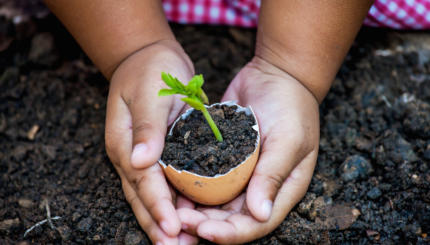The sign on a local church this week read: “Spring has sprung. Is your faith blossoming?” Faith does blossom when we see a world regenerating. We hear the birds after a silent winter. We see cherry trees flowering, the weather warming, and we feel the relief of color re-entering and puncturing the drab grey of winter.
We mark this special time with a holiday also called “The Holiday of Spring” or Hag Ha-Aviv. Passover helps us relive the exodus at a time of the year when redemption seems natural. If everything gets a new chance at life, we do too. We blossomed into a nation as the world around us paralleled the process. And to prepare for Passover, we make a special blessing — one of four that is said only once a year — over the flowering fruit trees of the Hebrew month of Nissan:
Baruch atah Adonai Eloheinu melech ha-olam shelo chiseir ba-olamo k’lum uvara vo briyot tovot v’ilanot tovim l’hitna’ot bahen b’nei Adam.
Blessed are You, Our God, King of the Universe whose world lacks nothing and who made wondrous creations and beautiful trees for human beings to enjoy.
Birkat HaIlanot
The language of the blessing offers us insight into why we make blessings in the first place. The Talmud recommends that we make one hundred blessings a day over everything from human wisdom to lightening to the smell of spices. We take in the sensory world and crown it with a blessing to make an ordinary moment special. We sanctify time and space when we look and listen and respond with a blessing. The text of the tree blessing is not about what we will one day eat but about pausing to note a world created for human enjoyment. Beauty is the handmaiden of spirituality.
I remember driving parallel to an orchard in Israel and seeing a group of schoolchildren sitting around a flowering fruit tree two weeks before Passover. They were obviously on a field trip from school to say this blessing together, and the teacher was clearly using the great outdoors as a wonderful classroom to teach about God and nature.

Help us keep Jewish knowledge accessible to millions of people around the world.
Your donation to My Jewish Learning fuels endless journeys of Jewish discovery. With your help, My Jewish Learning can continue to provide nonstop opportunities for learning, connection and growth.
A 16th century legal code mentions that the blessing over fruit trees is said only once annually and only on fruit-bearing trees. (Shulchan Aruch Orach Chayim 226:1) If one delays, the blessing cannot be made even if there is fruit on the tree. The idea is to capture the moment when the tree is flowering, beginning its majestic process of regrowth. My friend Nathan made me aware that the blessing is not recited in Nissan if fruit trees outside of Israel first flower earlier or later. The requirement is not about the month but about the season. We must mark spring whenever and wherever it arrives.
Some rabbis rule that this blessing should not be said on fruit trees that are grafted because they were created against God’s natural plan for the universe. Others believe that fruit from grafted trees is still worthy of a blessing because although we recite the prayer in the presence of a fruit tree, the tree is, in essence, representing all of creation. We also make blessings on the fruit from such trees before we eat them so it is easy to understand that we can bless the flower just as we can bless the fruit.
One legal opinion states that the ideal time to make the blessing is when we take our very first look at a flowering tree. It is then that the majesty of the season hits us in all of its splendor. It’s funny how we wake up one day and realize suddenly that the seasons have changed even though it is usually a gradual process. Although this same rabbi permits the blessing to be said after the first look but before the fruit forms, his statement of the ideal demonstrates that blessings remind us to stop and take a moment to watch the world around us show off a little. It’s the pause that refreshes.


